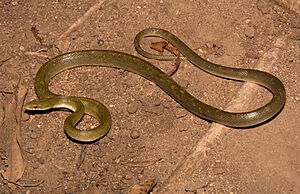Green rat snake facts for kids
Quick facts for kids Green rat snake |
|
|---|---|
 |
|
| Northern green ratsnake (Senticolis triaspis intermedia) from Sonora, México | |
| Conservation status | |
| Scientific classification |
|
| Kingdom: | Animalia |
| Phylum: | Chordata |
| Class: | Reptilia |
| Order: | Squamata |
| Suborder: | Serpentes |
| Family: | Colubridae |
| Genus: | Senticolis Dowling & Fries, 1987 |
| Species: |
S. triaspis
|
| Binomial name | |
| Senticolis triaspis (Cope, 1866)
|
|
| Subspecies | |
|
Three, see text. |
|
| Script error: The function "autoWithCaption" does not exist. | |
| Synonyms | |
Script error: No such module "Check for conflicting parameters".
The green rat snake (scientific name: Senticolis triaspis) is a cool, non-venomous snake. This means it's not harmful to humans. It belongs to a snake family called Colubridae. The Senticolis group has only one species, which is the green rat snake. You can find this snake only in certain places. These places include Central America, Mexico, and parts of southern Arizona and New Mexico in the United States.
Contents
About the Green Rat Snake
What Does it Look Like?
Green rat snakes can grow quite long. They can reach a total length of about 160 centimeters (or 63 inches). Imagine a snake longer than you are tall!
Their back is usually a pretty green or olive green color. Their belly is a lighter yellow. They have a long head and a thin body. Their scales are smooth and are arranged in 31 to 39 rows along their back.
Where Does it Live?
These snakes like to live in certain types of places. They often make their homes in evergreen forests. They also like open grassy areas.
You can find green rat snakes in many mountain ranges. These include the Baboquivari, Pajarito, Atascosa, and Santa Rita mountains. They also live in the Empire, Patagonia, Chiricahua, Swisshelm, Pedregosa, and Peloncillo mountains. All these places are in southeastern Arizona.
What Does it Eat?
The green rat snake is a predator. It hunts and eats small animals. Its diet includes lizards, birds, and even bats.
It catches its prey by using a special method called constriction. This means it wraps its body tightly around the animal. This makes it hard for the prey to breathe, and it helps the snake to eat its meal.
How Does it Behave?
Green rat snakes are mostly active during the day. This is called being diurnal. They hunt and move around when the sun is out.
Life Cycle and Reproduction
When a female green rat snake is an adult, she can lay eggs. She can lay up to nine eggs at one time. This group of eggs is called a clutch.
Different Kinds of Green Rat Snakes
Scientists recognize three different types, or subspecies, of the green rat snake. They are:
- Senticolis triaspis intermedia: This type is found in Arizona, New Mexico, and northern Mexico.
- Senticolis triaspis mutabilis: This one lives in Central America.
- Senticolis triaspis triaspis: You can find this type in southern Mexico.
 | Shirley Ann Jackson |
 | Garett Morgan |
 | J. Ernest Wilkins Jr. |
 | Elijah McCoy |


